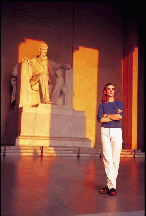Miss Clark goes to Washington
Studying the fall’s presidential debates, senior Cinda Clark contends that honesty should have been the best policy.
Miss Clark goes to Washington
Studying the fall’s presidential debates, senior Cinda Clark contends that honesty should have been the best policy.
 The day Al Gore officially announced his candidacy for President of the United States, I was sitting on a couch in his White House chief of staff’s office.
The day Al Gore officially announced his candidacy for President of the United States, I was sitting on a couch in his White House chief of staff’s office.
Above the Tennessee courthouse where Gore was speaking flew the American flag I had delivered from the Capitol to the White House travel office the morning before. During the 22 minutes he laid out his dreams for this country, my Vice President made me proud to be a part of something so historic.
By that point last summer as a Gore intern, I had read enough of his mail to understand that people write to their Vice President about the concerns that weigh heaviest in their hearts and lives. Senior citizens pleaded for affordable prescription drugs. Parents cried out for reduced media violence and gun availability. Working mothers removed from welfare shared their inability to afford proper health and day care for their children.
These people were asking for someone to talk to them about their fears in a way that made sense. I beamed that day because what I believed politics could be had become a reality.
My initial fascination with government was inspired by its role as the platform used to discuss the most fundamental issues in our society — health care, education, equal opportunity, economic stability, public safety, world relations, the environment.
On the day of his speech, I heard Gore speak directly to the people from his letters. He convinced me that politics could be honorable. My idealistic hope for the presidential debates that followed between Gore and George W. Bush was that the exchanges would be the perfect discussion outlet for the issues I had recognized as so important.
That ideal would become the centerpiece of my senior Honors research thesis. I began by asking questions traditionally used to judge presidential debates. Is character more important than depth of knowledge? How comforted are we by smooth rhetoric? How important is it to us that our president be handsome? Do we like it when the candidates criticize each other?
However, after watching this year’s three debates, I realized I forgot to ask the one question that should not be negotiable. How important is it to us that the candidates tell the truth?
Perhaps my expectations for the debates were too utopian, but I didn’t anticipate asking that final question. I foolishly assumed that the candidates would be forced into honesty by the spontaneous nature of live debate.
Instead, after every debate I found myself listening to commentators and journalists sweep up after both candidates’ distortions and false facts. While I had come to expect half-truths and exaggeration in television ads and stump speeches, my gut hoped these debates would be a relief from those tactics. When they weren’t, I took it personally on behalf of the people whose letters to Gore I had read — who were being cheated out of honest discussion about their concerns.
Along with many others, those same people were the ears behind the debates. Seniors were still searching for how they would get money to buy their medication. Parents were still looking for solutions to violence. Mothers still needed to take their uninsured children to the doctor.
My desire was that the debates would help them find their hope for an answer. Listening to citizens ask questions in the third debate, I remembered how grateful I had been to have my own concern personally addressed by Gore. Seated with the Vice President at a table, we exchanged questions about early childhood education.
In that town hall meeting, the very same type of communication between constituent and candidate should have taken place. That is the kind of conversation with our leaders the debates should encourage. Through this process, I think I’ve learned how the debates could provide those elusive answers.
I challenge the Committee on Presidential Debates, along with the campaigns themselves, to encourage honesty by not crippling discussion in debates with rigid formats. Candidates should be permitted to ask each other questions and offer rebuttals. Citizens participating in town hall meetings must be allowed to have conversation with the opponents and not be restricted to asking questions. Both changes would demand that the candidates be held accountable for their assertions.
Both changes would also bring more people into the discussion that is about them, anyway. This fall, I came back to Washington and spent part of my time interning at the Democratic National Committee.
I was driven to contribute to the campaign that energized and inspired me last summer. Now, the comparison of my two experiences has left me wrestling with an unfortunate lesson about how destructive a campaign can be to the integrity of a candidate’s message.
Still, I am not completely discouraged. I began listening to the beat of political discussion because I saw potential to reach people there, not because I believed it was perfect. My commitment to effective communication of powerful, personal issues has not changed.
Too many people still need messages they can understand and believe. If anything, I am more encouraged than ever. My idealism, however, is gone.

Your comments are welcome
Comments
Related Reading:
Campus News: Alma Matters
TCU’s Library Celebrates a Century
Uncover hidden gems of the academic hub, from vintage mechanics to modern masterpieces.
Campus News: Alma Matters
Infographic: TCU’s Shared Values
The Board of Trustees adopted four TCU values after considering input from more than 4,000 constituents.